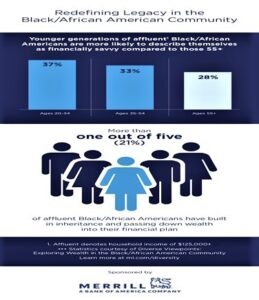RESEARCH SHOWS AFFLUENT BLACK/AFRICAN AMERICANS ARE FOCUSED ON REDEFINING LEGACY AND THE NEXT GENERATION
by Black Enterprise Editors (Sponsored by Merrill) Jan. 10, 2022

While many Black/African American families have traditionally etched their name in history through hard work and service, the younger generation are taking their goals a step further. Research published in 2021 from Merrill titled, Diverse Viewpoints: Exploring Wealth in the Black/African American Community, found that we are redefining our legacy.
Merrill’s research acknowledges a shift in attitudes among affluent Black/African Americans, from not talking about or planning for legacy building to passing down inheritances and values to further generational wealth. “In the history of my family, and the histories of many Black families, we haven’t had the opportunities to truly accumulate wealth until very recently,” said Doug, a professor quoted in the study. “This is our moment. Now, standing on the shoulders of [my ancestors] who came before me, I am in a position to build a new legacy for my family.”
The study, which includes insights from those earning over $125,000 per year, compares financial habits and beliefs of affluent Black/African Americans with those of the general population. A higher percentage of Black/African Americans are more likely to be motivated by a desire for personal achievement and the ability to give back to their community, according to the report, than the general population.
In an interview with Black Enterprise, entrepreneur Adenah Bayoh, who owns seven restaurants and a multimillion-dollar portfolio of real estate projects, said, “I want to leave my mark. I want to have an impact on this world. I want to make the landscape a little easier for the next generation of entrepreneurs. That is the driving force.” She shares her wealth-building journey in Black Enterprise’s new video series, Legacy Starts with Me.

“The person that has had the biggest influence of my existence was my grandmother,” Bayoh continued. “My grandmother made sure at a very early age I was fully integrated into what she was doing. There is a legacy there that I want to continue with my children. But most importantly, I am continuing my grandmother’s legacy of hard work, love, and community.”
The drive to create intergenerational wealth is one that’s becoming more visible. More than one out of five (21%) of affluent Black/African Americans have built-in inheritance and passing down wealth into their financial plan.
Many affluent Black/African Americans value opportunities to learn from others who have achieved the success they want to achieve. Merrill’s report shows they are twice as likely to have financial role models and four times more likely to look up to business and community figures/organizations as financial role models than affluent individuals of the general population.
“When I was growing up, my family would sometimes go to visit our grandparents for the weekend. My parents were successful businesspeople, but my grandparents’ homes were a different story. They still live in the tiny house where they raised five kids, including my dad, in a very different neighborhood than where we grew up. I was always struck by how they showed so much progress in so few generations,” said Benjamin, a 42-year-old technology consultant and study participant.
The legacy and lessons taught by previous generations is making an impact. This could be part of the reason affluent Black/African American millennials are more likely to describe themselves as financially savvy (37% of those ages 20-34 and 33% of those ages 35-54) compared to those that are 55 and over (28%)—a big shift in just two generations.
“My grandparents always pressed on the importance of hard work and education—how that was something no one could take away from you,” Benjamin continued. “I take those values from my grandparents and parents, and I now always try to teach my own 8-year-old daughter to understand why work and money are important.”
Passing on values, in addition to wealth, is one of the ways our community is reinterpreting the idea of legacy. Using the inspiration and resources around us to help improve our families’ financial lives, we’re being intentional about building intergenerational wealth and becoming role models for the community.
To learn more about this research, visit ML.com/diversity
